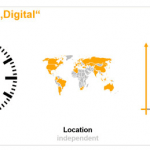Es ist selten dass mich Slides so fesseln, wie diese von Jürgen Appelo – und das trotz der insgesamt 162 Folien. Zunächst fällt auf, dass Jürgen Appelo über komplexe Systeme und unseren Umgang damit sehr anschaulich und verständlich berichtet. Irgendwie könnte man den ganzen Foliensatz als schöne Einführung ins systemische Denken verwenden. Hier nur eine kleine Auswahl der gesammelten Aussagen:
36. Actually, there are no systems
Where to draw a boundary around a system depends on the questions we want to ask. – Donella H. Meadows Thinking in Systems
50. Complexity theory is about change
„Complexity theory is not a cohesive theory. It is not one equation. It is really a collection of ideas about the concept of change in complex adaptive systems … It talks about the dynamics of change in a system“.–
Irene Sanders The Interaction of Complexity and Management
59.
You can try to simplify a system to make it understandable.
But you cannot linearize the system to make it predictable.
130. Retrospective coherence
Any evidence provided will depend on the period selected and the place in which the events are occurring as well as other aspects of context.
It follows that any relationship anyone identifies between a management action and an outcome could have far more to do with a particular time and place where the sample is selected than anything else. –
Ralph Stacey Complexity and Organizational Reality
131. Assume subjectivity and coevolution
The observer influences the system, and the system influences the observer.
The people form the culture, and the culture forms the people.
Zu Recht verweist Appelo auf die notwendig vielen Perspektiven zum Verstehen komplexer Systeme. Sein ganzer Foliensatz sammelt diese Perspektiven in Form von Zitaten anderer Experten. Auch dadurch überzeugt mich dieser dieser Vortrag. Appelo lebt vor, was er sagt. Unbedingt lesenswert.

